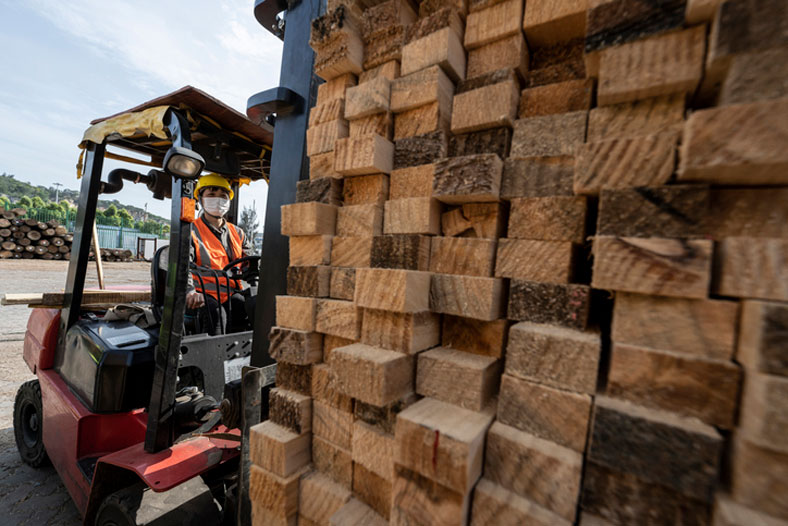Written by Scott Wilson

We can give you a great textbook definition of what a supply chain manager does …
A supply chain manager handles the planning and coordination of materials flowing into an organization, the creation of product from those materials, and the distribution of finished goods to end-users.
… but if you are looking at starting a career in the field, that’s not a very satisfying answer.
The difficulty in providing a more true-to-life vision of what a supply chain manager does from day-to-day is in the breadth of the supply chain itself. With so many different aspects of SCM, in so many different industries, there’s a wide variety of jobs and activities involved.
- Supply chain managers handle PROCUREMENT, developing material sourcing and negotiating contracts. They deal with supplier relationships and diversity to ensure the raw materials keep flowing.
- Supply chain managers take care of LOGISTICS and TRANSPORTATION needs, managing the storage, inventory, and shipping on both inbound and outbound sides of a company’s operations.
- Supply chain managers PLAN and ANALYZE to ensure stability and to get a competitive advantage. They track the progress of materials through the organization and tweak operations to optimize efficiency. They also keep an eye on the larger environment, staying ahead of price spikes or material gluts in the market.
- Supply chain managers develop STRATEGY around logistics and processing operations. They offer insights to senior executives and come up with new ideas and techniques to get ahead of the competition.
- Supply chain managers oversee OPERATIONS that handle and process raw materials into products and services. They take responsibility for the distribution of goods to customers and handle return and resolution processes.
Each of these roles is critical to managing the supply chain. Some supply chain managers spend an entire career concentrating in only one of those elements of the job. Others may jump between them as they climb the corporate ladder. And many supply chain management roles combine some or all those responsibilities in one job.
All of them take skills and insights that can be unique to their function and the industry they are performed within.
What Does Supply Chain Management Involve?

As a practical matter, the only way to look at supply chain management comes down to the overall responsibilities that a manager fulfills. Although the day-to-day tasks that fulfill those obligations can vary a lot, the overall objectives are consistent for every kind of supply chain management job:
- Observe and analyze processes and products. All supply chain managers must keep their eye on the ball, seeing things that other staff can’t in the flow of goods and materials through the organization. This gives them the information they need to perform every other part of the job.
- Report and make recommendations. Whether it’s to the chief executive, outside vendors, or to other departments, supply chain managers rely on communication skills to coordinate and improve utilization and procurement.
- Improve efficiencies throughout the supply chain. Supply chain managers are on a constant quest to do things better, faster, and at less expense. Their insights shave points off inventory and minutes off handling, making the business better at whatever business it is in.
- Troubleshoot and solve problems on the fly. The supply chain has a lot of moving parts. That makes it prone to disruption, whether it’s a blown tire on a delivery van or a hurricane pinning vital cargo containers on a ship far offshore. Supply chain managers are the ones responsible for fixing, avoiding, or just plain old going around such problems.
That means that most supply chain managers are using similar job skills every day, even if they apply them in different roles. Those skills include:
- Communicating with staff and other departments or companies
- Managing projects of various sizes
- Coordinating teams and operations both within and outside of the organization
- Planning for upcoming events and operations
- Tracking data and keeping account of performance and material status
Fine-tuning those skills in any industry or position requires experience. But developing the core capabilities of organization, communication ability, and strategic thinking is something you can accomplish with a degree in supply chain management.
Every Industry Relies on Supply Chain Management; Every Supply Chain Management Job Is Influenced by Industry

Of course, the daily applications of those skills will revolve around the challenges of your industry. The work of a warehouse supervisor at a lumberyard is going to be pretty different on a daily basis from one working in a high-volume e-commerce shipping facility.
We’ve put together a list of many of the industries that most commonly employ supply chain managers and described the positions and education needed to fill them.
Learning how your trade works in any of these businesses can happen through trial and error on the job. But a better way to get yourself prepared for the kind of position you seek is to tailor your college training to get the right skills.
That lumber warehouse manager is going to want to learn everything about humidity and material properties to keep plywood sheets from warping. They’ll want to learn things about AWI (Architectural Woodworking Institute) standards for climate control for wood storage.
The e-commerce guru may need to dive into robotics and automation for high-speed order fulfillment. They’ll learn to interface with ERP (Enterprise Resource Planning) systems and about efficient packing systems to maximize loads on outbound delivery vehicles.
Either way, higher education is the secret weapon to prepare for the job.
Learning How to Apply the Supply Chain Management Process Successfully

There’s only one route to learning all the complexities and techniques needed to make these processes come together smoothly. And that’s by getting a college education in supply chain and logistics management.
Degrees in this field are sprouting up all over the country. And you can find them at almost any level of college:
- Associate degrees in supply chain management offer foundational skills for moving on to bachelor’s programs or getting in on the ground level of logistics in warehousing or transportation.
- Bachelor’s degrees in supply chain management prepare you for entry-level management positions. With a side of liberal arts coursework, they offer a well-rounded education you can take to any SCM specialty.
- Master’s degrees in supply chain management, or the related Master of Business Administration in supply chain management, give you the tools to truly master any specialty in SCM, or to take the broad overview of logistics needed in the most senior positions.
With different focuses and levels of intensity, all these degrees offer the kind of skills and knowledge needed to do the job of a supply chain manager:
- Identifying critical metrics in pricing, transport time, storage capacity, inventory levels, and other crucial logistical factors and gathering and analyzing data
- Communicating with staff and vendors to keep everyone on the same page, even when packages are traveling around the world
- Developing plans for both long-term strategic goals and to deal with immediate needs in your organization
- Understanding how to negotiate, interpret, and manage contractual obligations from both sides of the table
- Managing operations in both storage and transportation systems
- Connecting logistics functions and plans to overall organizational objectives
The broad, international nature of most modern supply chains is one of the reasons a college degree is so useful in the field today. Beyond the purely technical parts of logistics, you need context and cultural capabilities in modern supply chain management. Getting the wheels rolling is about more than wheel chocks and cargo loading. You have to get what’s going on with global markets, relate to the goals and needs of union dock workers, and learn how to get things done when working with customs officials in countries where you do business.
A standard American college education is built to meet those needs.







